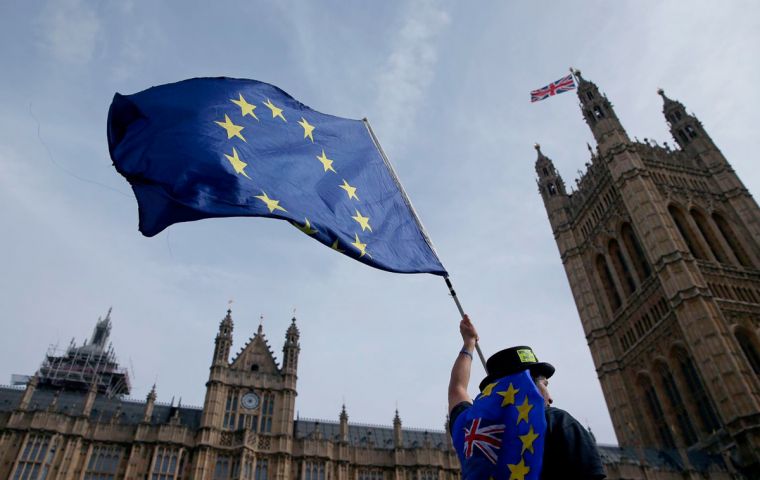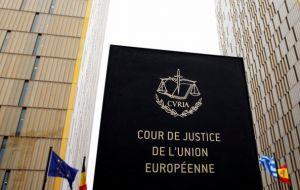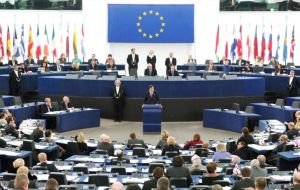MercoPress. South Atlantic News Agency
New battle front for Brexit: revocation of Article 50 addressed to the European Court
 This is the most significant legal development in the Brexit process since the High Court ruled Parliament had to legislate before Government could invoke Article 50
This is the most significant legal development in the Brexit process since the High Court ruled Parliament had to legislate before Government could invoke Article 50  Lord Carloway, Scotland’s most senior judge said it was “clear” MPs at Westminster would be required to vote on any Brexit deal agreed by EU and UK .
Lord Carloway, Scotland’s most senior judge said it was “clear” MPs at Westminster would be required to vote on any Brexit deal agreed by EU and UK .  This means the UK Parliament will get clear guidance from the EU Court of Justice about the precise powers open to it when it is asked to vote on the Brexit deal
This means the UK Parliament will get clear guidance from the EU Court of Justice about the precise powers open to it when it is asked to vote on the Brexit deal  “The decision will also provide helpful guidance to the European Parliament and to the devolved governments of the UK.”
“The decision will also provide helpful guidance to the European Parliament and to the devolved governments of the UK.” The European Court will be asked if the UK can unilaterally revoke its Article 50 request to leave the European Union, following a “bombshell” ruling from Scotland’s highest court. In what campaigners described as a “case that could decide the fate of the nation”, the Court of Session in Edinburgh announced it would refer the question on to the Court of Justice of the EU (CJEU).
As a result of the “urgency of the issue”, with the UK due to leave the EU on March 29 2019, it said the request was being expedited procedure. The decision from Lord Carloway, Scotland’s most senior judge and Lord President of the Court of Session, overturns a ruling in June when it was said the question being asked was “hypothetical” and the conditions for a reference had not been met.
But Lord Carloway said it was “clear” MPs at Westminster would be required to vote on any Brexit deal agreed by the EU and the UK Government.
He stated: “It seems neither academic nor premature to ask whether it is legally competent to revoke the notification and thus to remain in the EU. The matter is uncertain in that it is the subject of a dispute; as this litigation perhaps demonstrates.
“The answer will have the effect of clarifying the options open to MPs in the lead up to what is now an inevitable vote.”
The case has been brought by a cross party group of politicians: Labour MEPs Catherine Stihler and David Martin, Joanna Cherry MP and Alyn Smith MSP of the SNP and Green MSPs Andy Wightman and Ross Greer, together with lawyer Jolyon Maugham QC, the director of the Good Law Project.
Lawyers at Balfour+Manson acted for the petitioners, with executive chairman Elaine Motion stating: “This is the most significant legal development in the Brexit process since the High Court ruled that Parliament had to legislate before the Government could invoke Article 50.
“This latest decision means the UK Parliament will get clear guidance from the European Court of Justice about the precise powers open to it when it is asked to vote on the Brexit deal.
“The decision will also provide helpful guidance to the European Parliament and to the devolved governments of the UK.”
Mr Maugham described the ruling from the Court of Session as an “absolute bombshell of a judgment for the Government”. He added: “It is no exaggeration to say this is a case that could decide the fate of the nation.
“It’s not too late to wake up from the nightmare that is this Government’s Brexit. Today is a vital step in proving we can remain in the EU with all of our opt outs and rebates.
“There are precedents for very speedy decisions and – my sources at the Court of Justice say – we should have its decision before Christmas.”
In his judgment, Lord Carloway was clear the CJEU would not be advising Parliament on “what it must or ought to do”. Instead he said it would be “merely declaring the law as part of its central function”, adding that “how Parliament chooses to react to that declarator is entirely a matter for that institution”.
Afterwards Mr Wightman said he was “delighted that Inner House has upheld our appeal & agreed to refer question of unilateral revocability if Article 50 to the CJEU”.
Mr Smith hailed the decision as “big news” as he tweeted: “Scotland’s Court of Session has agreed to refer our case to the European Court of Justice in Luxembourg for a ruling on how to revoke Article 50. Brexit is not inevitable, there is still time to change course.”
A Government spokesman said: “We are disappointed by the decision of the Court. We are giving it careful consideration. “But as the Government has repeatedly said, we are committed to implementing the result of the referendum and will not be revoking Article 50.”




Top Comments
Disclaimer & comment rules-

-

-

Read all commentsWhat kind of democracy are you taking about...?
Sep 23rd, 2018 - 05:03 pm +2Is it the type where England and the English voters get to overrule what Scotland and Northern Ireland actually voted for...?
In a situation where four separate countries are part of one united one it should have been a majority in all four countries needed...that would be democratic...
You coming from a melting pot colony with no discernible identity having existed for two minutes have no idea of what you are taking about...
Also I dare say there are more commie bastards in the US than the UK...how many Russians ya got now...?
“You coming from a melting pot colony with no discernible identity having existed for two minutes have no idea of what you are taking about...”
Sep 23rd, 2018 - 10:56 pm +1Nah, that's normal for him, it's got nothing to do with where he's from.
And we wouldn't be in this position at all if we had a responsible government. If they were going to hold a referendum they should have made plans and proposed some feasible alternative first. People should not have been asked to vote for a complete unknown, there should have been some provision for the different countries, and turnout requirements.
Who ever said the referendum was legally binding anyway...
Sep 22nd, 2018 - 11:29 pm 0”The European Union Referendum Act required a referendum to be held on the question of the UK’s continued membership of the European Union (EU) before the end of 2017. It did not contain any requirement for the UK Government to implement the results of the referendum. Instead, it was designed to gauge the electorate's opinion on EU membership”
Why doesn't a responsible Govt simply declare that it is not in the best interests of the UK at this present time to withdraw from the EU...
The evidence is all out there for everyone to see, it's not a case of Brexiteers claiming that the UK can have its cake and eat it anymore...we can now see that is not going to happen...
Commenting for this story is now closed.
If you have a Facebook account, become a fan and comment on our Facebook Page!